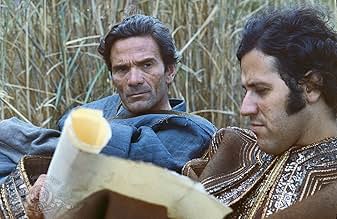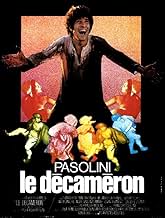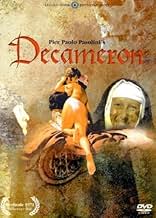AVALIAÇÃO DA IMDb
7,0/10
13 mil
SUA AVALIAÇÃO
Adaptação de nove contos do "Decamerão" de Boccaccio.Adaptação de nove contos do "Decamerão" de Boccaccio.Adaptação de nove contos do "Decamerão" de Boccaccio.
- Prêmios
- 1 vitória e 3 indicações no total
Jovan Jovanovic
- Rustico
- (cenas deletadas)
Maria Gabriella Maione
- Una madonna
- (as Gabriella Frankel)
Pier Paolo Pasolini
- Allievo di Giotto
- (as P.P. Pasolini)
- Direção
- Roteiristas
- Elenco e equipe completos
- Produção, bilheteria e muito mais no IMDbPro
Enredo
Você sabia?
- CuriosidadesO Decameron (1971) is the first film in Pier Paolo Pasolini's "Trilogy of Life," continuing with Os Contos de Canterbury (1972) and concluding with As Mil e Uma Noites (1974). Each film was an adaptation of a different piece of classical literature focusing on ribald and often irreligious themes. The tales contain abundant nudity, sex, slapstick and scatological humor.
- Erros de gravaçãoWhen the Mother Superior seduces the deaf-mute boy, he's sleeping in a tomato garden. Tomatoes are a New World crop that wouldn't be brought to Italy for another two centuries. The same is true of the corn (maize) growing in the convent's little field.
- Citações
Allievo di Giotto: Why create a work of art when dreaming about it is so much sweeter?
- Versões alternativasAlthough the cinema version was intact the 1988 UK Warner video was cut by 22 secs by the BBFC to remove shots of naked genitals during the bedroom sex scene with the nun. The cuts were fully restored in the 2001 BFI DVD release.
- ConexõesEdited into Porno & libertà (2016)
- Trilhas sonorasFenesta Ca Lucive
Written by Guglielmo Cottrau, Vincenzo Bellini and Giulio Genoino in 1842
Performed by Franco Citti
Sung by Ser Ciappelletto and his Neapolitan hosts in Germany. Also sung by one of the Neapolitans to a monk.
Avaliação em destaque
Pasolini is the only one of my cherished filmmakers who does not have a film in my list of greats, a weird thing. I love how he makes films but the main narrative thrust as carried in the long arch is usually so obvious, so extrovertly Italian, exposing modern absence of purpose in Teorema, human self-delusion here, that it seems like something we always knew.
But he is a master of sculpting cinematic air, and this is a truly intelligent work of the medium, and not for any point it makes for sexual freedom or against religion.
A few of the individual joys first, because he is so joyous to watch. The faces he finds, such astonishingly expressive Italians. they are not actors in the ordinary sense, they do not mask deeply troubled soul in the coy way of puritans like Bergman. They are human sculptures, each one seemingly handpicked as exuberant fresco of earthy, toothless mirth. His sense of place is naked, unadorned, discovered; unlike so many Merchant Ivory or Hollywood period pieces, I feel like I inhabit this world. His camera, again unadorned, even sloppy at times, but as revelatory as anyone's.
In all these he teases the same spontaneous quality, that is what gives his work a certain careless air; but that is being carried by inspiration, instead of fixating on appearance. As honest as it is vital, because it was not excessively tampered with. He does not impose, paint beauty from the outside, it inwardly springs from air, from the flow of tangible emotion in tangible space jolting us into direct experience. Herzog could do it while being magical, few others. The film is a comic-book, an operabuffa in its narrative, but it's not without gravity that is life, nor is this the same as that tired business of 'realism' favored by the unimaginative like Nolan.
Where it really soars is in the overall gaze, however pleasant, it is the gaze that elevates this to required viewing for me.
All you need to know about the film is that it is in the form of thematically linked stories, centered in medieval Naples with rascals and scoundrels caught in mischief, often sexual. It is both funny and poignant, a film made for the same rowdy people it depicts. As said, the deeper purpose of the work is so readily available, show the marvelously flawed human being in all its buffonery and self- delusion, we may be inclined to think it 'small'. I think the problem is largely ours, myself included—we often mistake complexity for intelligence, reason with words instead of seeing the formative fabric.
So this isn't complicated in what it says, but it is some of the most intelligent stuff I have seen.
Look at the film again. In each story someone is being deceived, as are we watching a film. In each story, as in the overall film, the lie or deception reveals a more penetrating truth about self. Various selves pursue truth (linked to freedom from the norm), sometimes against the restraints of the story, sometimes killed by the story, sometimes negotiated to be a part of the story. So the easiest thing to do, what many crass minds would do, is to emphasize the strongest emotion, despair in one story, hypocrisy in another, and pull on that to draw audience reactions. We'd still have pretty much the same point, human buffoonery.
It's all in Pasolini's multifaceted expression; in the first story with Andreuccio who came to buy horses, the poignant, ascetic lesson of 'thank god for losing your money' is uttered by two sneaky louts, so registers as both guidance and deception; in the story with the fake deaf-mute boy in the convent, the head nun deludes herself with the nonsensical miracle but simply oozes sexual joy as she rushes to ring the bell; in the story with two young lovers discovered the morning after sex by the parents of the girl, there is obvious hypocrisy by the father but everyone in the end happily gets his heart's desire; in the story with the illicit Sicilian boyfriend, we have both a sense of genuine bonding in the grove among the boys and awareness of its duplicity.
The apotheosis, the most emblematic instance, is perhaps the cuckold potter; we get once more both the obvious duplicity, being cheated on, but also the ecstatic, enigmatic laughter of the divine fool who is each of us.
See, Pasolini could point out social wrongs, or just plain stupidity, as well as Godard, but he could not afford to be a sweeping fool. Remember, he was a communist expelled from the Party in his youth because of his homosexuality—the best thing that could happen to him as an artist.
What he does here is the same, a truly gentle soul. He sketches very simple desires, then bit by bit he challenges the simplicity of our logical leaps in dealing with them, leaps over unfathomable soul. The nun's miracle is nonsensical, but that is her way of coping with newfound joy.
Who's to condemn her? Who, not being able to see her ecstasy, would be so dumb as to point out the fallacy of the miracle?
This is real intelligence folks, the foundation of it. Seeing through the illusion to the self that gives rise to it, this being real freedom from the norm.
But he is a master of sculpting cinematic air, and this is a truly intelligent work of the medium, and not for any point it makes for sexual freedom or against religion.
A few of the individual joys first, because he is so joyous to watch. The faces he finds, such astonishingly expressive Italians. they are not actors in the ordinary sense, they do not mask deeply troubled soul in the coy way of puritans like Bergman. They are human sculptures, each one seemingly handpicked as exuberant fresco of earthy, toothless mirth. His sense of place is naked, unadorned, discovered; unlike so many Merchant Ivory or Hollywood period pieces, I feel like I inhabit this world. His camera, again unadorned, even sloppy at times, but as revelatory as anyone's.
In all these he teases the same spontaneous quality, that is what gives his work a certain careless air; but that is being carried by inspiration, instead of fixating on appearance. As honest as it is vital, because it was not excessively tampered with. He does not impose, paint beauty from the outside, it inwardly springs from air, from the flow of tangible emotion in tangible space jolting us into direct experience. Herzog could do it while being magical, few others. The film is a comic-book, an operabuffa in its narrative, but it's not without gravity that is life, nor is this the same as that tired business of 'realism' favored by the unimaginative like Nolan.
Where it really soars is in the overall gaze, however pleasant, it is the gaze that elevates this to required viewing for me.
All you need to know about the film is that it is in the form of thematically linked stories, centered in medieval Naples with rascals and scoundrels caught in mischief, often sexual. It is both funny and poignant, a film made for the same rowdy people it depicts. As said, the deeper purpose of the work is so readily available, show the marvelously flawed human being in all its buffonery and self- delusion, we may be inclined to think it 'small'. I think the problem is largely ours, myself included—we often mistake complexity for intelligence, reason with words instead of seeing the formative fabric.
So this isn't complicated in what it says, but it is some of the most intelligent stuff I have seen.
Look at the film again. In each story someone is being deceived, as are we watching a film. In each story, as in the overall film, the lie or deception reveals a more penetrating truth about self. Various selves pursue truth (linked to freedom from the norm), sometimes against the restraints of the story, sometimes killed by the story, sometimes negotiated to be a part of the story. So the easiest thing to do, what many crass minds would do, is to emphasize the strongest emotion, despair in one story, hypocrisy in another, and pull on that to draw audience reactions. We'd still have pretty much the same point, human buffoonery.
It's all in Pasolini's multifaceted expression; in the first story with Andreuccio who came to buy horses, the poignant, ascetic lesson of 'thank god for losing your money' is uttered by two sneaky louts, so registers as both guidance and deception; in the story with the fake deaf-mute boy in the convent, the head nun deludes herself with the nonsensical miracle but simply oozes sexual joy as she rushes to ring the bell; in the story with two young lovers discovered the morning after sex by the parents of the girl, there is obvious hypocrisy by the father but everyone in the end happily gets his heart's desire; in the story with the illicit Sicilian boyfriend, we have both a sense of genuine bonding in the grove among the boys and awareness of its duplicity.
The apotheosis, the most emblematic instance, is perhaps the cuckold potter; we get once more both the obvious duplicity, being cheated on, but also the ecstatic, enigmatic laughter of the divine fool who is each of us.
See, Pasolini could point out social wrongs, or just plain stupidity, as well as Godard, but he could not afford to be a sweeping fool. Remember, he was a communist expelled from the Party in his youth because of his homosexuality—the best thing that could happen to him as an artist.
What he does here is the same, a truly gentle soul. He sketches very simple desires, then bit by bit he challenges the simplicity of our logical leaps in dealing with them, leaps over unfathomable soul. The nun's miracle is nonsensical, but that is her way of coping with newfound joy.
Who's to condemn her? Who, not being able to see her ecstasy, would be so dumb as to point out the fallacy of the miracle?
This is real intelligence folks, the foundation of it. Seeing through the illusion to the self that gives rise to it, this being real freedom from the norm.
- chaos-rampant
- 11 de jun. de 2013
- Link permanente
Principais escolhas
Faça login para avaliar e ver a lista de recomendações personalizadas
- How long is The Decameron?Fornecido pela Alexa
Detalhes
- Data de lançamento
- Países de origem
- Idiomas
- Também conhecido como
- The Decameron
- Locações de filme
- Empresas de produção
- Consulte mais créditos da empresa na IMDbPro
Bilheteria
- Faturamento bruto mundial
- US$ 839
- Tempo de duração1 hora 51 minutos
- Mixagem de som
- Proporção
- 1.85 : 1
Contribua para esta página
Sugerir uma alteração ou adicionar conteúdo ausente

Principal brecha
By what name was O Decameron (1971) officially released in Canada in French?
Responda



























